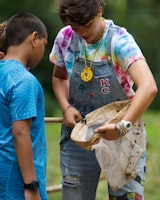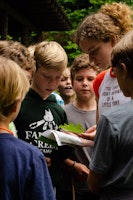
Nature Guide
Start Your Application
Nature Instructor Description
As a Nature instructor at Falling Creek, you will explore the 900 acres of trails, lakes, bogs and creeks around camp, teaching campers about the flora and fauna native to the southern Appalachian mountains. Each day brings a new adventure in Nature, and you will discover things around camp and in the woods that you have never noticed before. The Nature activity program gives you a chance to have fun getting muddy, wet, and dirty, all while educating boys about the habitats of animals that live near camp.
Learn more about Falling Creek’s efforts as a “Green Camp” here
Some of our Nature topics include stewardship/conservation, endangered local plants, ecology, animal care, insects and pollinators, geology, astronomy, weather, trees, and fungi. Throughout the summer you’ll use experiential education to teach boys about the environment, and our place in it. You’ll be instructing a wide range of ages and skill levels, and helping to foster a love of the outdoors in the next generation. Under your guidance and teaching, boys have the opportunity to work on the five different progression levels in the Nature program, culminating with the achievement of “Warrior”.
Save Your Spot
What’s a Typical Day Like For This Position?
This blog shares a glimpse into a day at the “Nature Hut!”
Male camp counselors live in a cabin with one other counselor and eight campers. In addition to their activity instruction, male counselors will have an assortment of responsibilities related to the management of their cabin. Female camp counselors also serve as activity staff, but don’t live in cabins with the campers, and are responsible instead for organizational tasks during the times that male staff are busy with their cabins.
Each day at camp begins with waking up and gathering as a community at Morning Watch. Next we enjoy a hearty breakfast and an exciting Morning Assembly on the porch. Then it’s off to the first three activities of the day, followed by a period of Free Choice before lunch. On a typical day, each counselor will be assigned a specific area to supervise during one Free Choice period, and have the other Free Choice period to themselves as their “Self-Care Time”. Rest Hour happens after lunch, before the three activity periods in the afternoon. Then there is the second Free Choice period, dinner, and a fun Evening Program! A typical day ends with Milk and Cookies, followed by Evening Embers, a discussion time with your cabin mates to talk about the day’s adventures. Everyone is tired and happy by the time it’s Lights Out. On weekends, we take a break from our regular activity instruction, sleep in an extra hour, and play games as a whole camp community.

At Falling Creek, campers are free to choose the 6 activities they want on their daily schedule. Even though you might have 8 boys in your cabin who are the same age, you’ll be instructing a variety of ages and skill levels throughout the day in your 50 minute long activity periods. On a typical day, you’ll meet the campers in each activity period at the Nature Hut by the lower lake, and can either do that day’s lesson in the Hut or head out across property to explore and learn.
You might give a lesson on tree and leaf identification, feed the snakes and other animals living in the Nature Hut, go on a mushroom identification hike, learn how to predict and respond to weather changes when outdoors, or host an overnight camping trip to identify constellations. You and your fellow Nature instructors will have lesson plans (that you can help build!) that will be tailored to cover all the different parts of the program.
Our society doesn’t provide much direct experience in nature today, and as the young spend less and less of their lives in natural surroundings, I’ve always suspected that their senses don’t fully develop and they don’t experience the richness of the human experience. One essential part of Falling Creek’s value, which is difficult to understand as a camper, is the role of nature in one’s early spiritual development. Falling Creek is an antidote for today’s addictive ‘screen time’ and lack of social interaction, recreation, and outdoor time. When I think about Falling Creek, I remember the mountaintop and the lakes, surrounded by the deep woods that obscured the cabins. I think about the voices, singing, and laughter during the summers that went too fast. And I think of the quiet off-season, planning and preparing as I watched the turkeys, deer, and bears of winter. Eventually, everyone wanders away from this magical place called Falling Creek, but we never wander away from the impact it has had on our lives.
Chuck McGrady, Director Emeritus and Former National President of the Sierra Club
Need internship credit?
Many of our counselors who need internship credit to graduate don’t realize that they can earn that credit while working at camp! We can coordinate with your department to tailor a unique learning experience, and have set up internship credit across a wide variety of disciplines. Read more about the value of an internship at camp or how to translate your camp experience to your resume.
Working at camp isn’t just fun and rewarding, it’s also a great way to jumpstart your professional development. The skills critical for success in today’s world are developed and practiced at camp, including communication, collaboration, critical thinking, creativity, and contribution. You’ll make connections with people from a variety of cultural backgrounds, across the country and around the world. Being a Falling Creek alumni also connects you to a network of former staff and parents who are business owners, entrepreneurs, outdoor industry professionals, and employers. We are frequently asked to refer our most talented staff members.
Career Development & Resources
Why Should You Be a Nature Instructor?
As a Nature instructor, you’ll play an important role in helping boys gain a better understanding of the environment that surrounds them, and how they can be better stewards of the earth. Under your guidance, boys can learn about the wide variety of flora and fauna that call this region home. You’ll help them learn valuable outdoor skills that can be used for the rest of their lives. Through the Nature program, our goal is to strengthen the connection boys have with the outdoors.

As a camp counselor, you’ll be a role model for the boys both in and out of your activity, helping them gain both knowledge and confidence in the outdoors. If you’re majoring in outdoor education, recreation management, agriculture, or teaching, being a summer camp Nature instructor will be a rewarding experience that will give you helpful skills for your future career path. Even if your college major is unrelated to the outdoors, you’ll still be gaining leadership skills and networking connections that will give you a competitive edge in the job market, no matter where you’re headed next.
What’s My Time-Off Like?
Each week you’ll receive a scheduled time-off period of approximately 34 hours, typically in one block of time. While the 2025 time-off schedule specifics are up for discussion during this off-season, in 2024 a time-off period started at 1 pm on a certain day and ended at 11 pm the next day. For example, someone with a Monday time-off period would be off from 1 pm Monday to 11 pm Tuesday. Staff are also able to take an hour of “self-care time” each day at camp, where you are free to read, workout, nap, or do anything you need to “recharge your batteries” daily. Everyone gets the same amount of time off; the schedule is based on your position and role at camp. Being well-rested and refreshed is a must! (During session changeover weeks, this schedule is altered slightly.)
What Benefits Do I Get?
We offer a competitive and progressive pay schedule that is determined based on your experience, age, education, certifications, and other factors. See the 2025 Estimated Pay Sheet here. Staff working the full summer (Orientation plus 4 sessions) will have a base pay of $4300, not including additional pay, experience, and bonuses.
In addition to housing, food, and pay, each day at camp brings adventure, physical recreation, and endless opportunities for personal and professional growth. You are welcome to use the camp facilities and participate in activities during your free time, so long as it does not take away from a class or camper.
Visit our “What You Get” page to read more about the value of an internship at camp, how to translate your camp experience to your resume, resources, networking, and certifications offered.
When Do I Need To Be Available?
While individual dates may differ based on your personal contract, our summer season is from mid May to mid August, and our preference is to hire for the full season. For the 2025 season,
All-Staff Orientation begins on May 30th (Friday, arrive by 10 am). Closing Day is August 15th after the final session.
Depending on your role at camp, you may need to arrive earlier in May for additional training. We begin WFR certification training (for Adventure Staff only) on May 17th, followed by Leadership Training (for Line Leadership, Activity Leaders, Adventure Staff, Lifeguards, and Horseback Staff only) on May 26th. You also have the option to extend your contract by joining us for Father/Son Weekends.
What Essential Skills Are Needed?
Staff must be at least 18 years old, and/or completed at least one year of college or similar life experience.
Our mission is existing to shepherd the journey of personal growth through love and adventure. Staff must be dedicated to live by the Falling Creek Code.
Patient. Flexible. Team Player. Genuinely Enthusiastic. Friendly. Eager to Grow. Open to Offer and Receive Feedback. Able to Think on Your Feet. Good Decision Maker. Hard Working. Get-It-Done Attitude.
See more on our staff FAQs page.